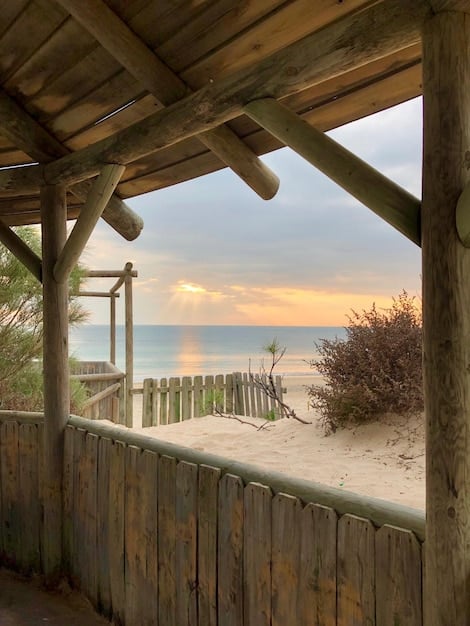Snag Beachfront Stays Under $150/Night in 2025: Insider Tips

Securing affordable beachfront accommodations for under $150 per night in 2025 is achievable by leveraging off-peak travel, booking early, exploring alternative lodging, and utilizing loyalty programs and last-minute deals effectively.
Dreaming of waking up to the sound of waves without breaking the bank? For many, a beachfront vacation seems like an unattainable luxury. However, with the right strategies and a bit of foresight, it’s entirely possible to discover how to snag beachfront stays for under $150/night in 2025: insider tips that can transform your travel dreams into reality. This guide dives deep into practical, actionable advice to help you secure that coveted ocean-view room without emptying your wallet.
Mastering Off-Peak Travel and Timing
One of the most effective strategies for finding beachfront deals is to align your travel plans with the “off-peak” or “shoulder seasons.” These are periods when demand is lower, leading to significant price reductions across the board, from flights to accommodations. Understanding when and where to go can shave hundreds off your total travel cost.
Traveling during the shoulder seasons—typically the weeks just before or after the peak summer or winter holidays—offers a sweet spot. You’ll often find pleasant weather, fewer crowds, and lower prices. For many coastal destinations, this means late spring (April-May) and early fall (September-October). For southern states like Florida, the sweet spot might be late fall or early spring, avoiding the intense summer heat and hurricane season.
The Advantages of Mid-Week Stays
Beyond the season, the days of the week you choose to travel can make a substantial difference. Weekends consistently drive up demand and prices, especially for beachfront properties. Shifting your stay to mid-week (Monday through Thursday) can result in daily rates that are 20-40% lower than weekend prices. This is a simple yet powerful trick.
* Lower Rates: Hotels and rentals often have dynamic pricing, meaning mid-week demand causes prices to drop significantly.
* Fewer Crowds: Enjoy more serene beaches, less crowded restaurants, and shorter lines for attractions.
* More Availability: You’ll have a better chance of finding your ideal room or rental type.
Long stay discounts are another hidden gem. If you have the flexibility, booking a full week might unlock a reduced nightly rate, even if you can only stay for five or six nights. Always compare the weekly rate against the sum of individual nightly rates. Sometimes, paying for an extra night you don’t use still results in overall savings.
Weather Considerations and Flexibility
While chasing shoulder seasons, it’s crucial to be mindful of weather patterns. Tropical destinations have hurricane seasons, and some northern beaches can be quite chilly in early spring or late fall. However, this risk often correlates with lower prices. Being flexible with your destination can be key here. If the Caribbean is experiencing hurricane season, perhaps a southern California beach or a lesser-known Gulf Coast spot might offer better weather and prices. Staying informed about weather forecasts allows you to weigh the risks against the potential savings. Remember, “under $150/night” often requires balancing desire with pragmatic flexibility.
The goal is to find those windows of opportunity where the weather is still enjoyable, but the masses haven’t arrived or have already departed. This strategy demands a bit of research, but the payoff can be substantial. Look for school holiday schedules in your target destinations and try to avoid those dates. Even a week’s difference can change prices dramatically.
Unearthing Hidden Gems: Alternative Accommodations and Locations
When beachfront property comes to mind, large resorts are often the first image. However, a wealth of alternative lodging options exist that can provide direct beach access or stunning ocean views without the resort price tag. Expanding your search beyond traditional hotels is paramount for budget travelers.
Exploring Vacation Rentals and Guesthouses
Websites like Airbnb, Vrbo, and local vacation rental management companies are goldmines for unique and affordable beachfront stays. These platforms often list condos, apartments, or even entire homes that are directly on the sand or just a stone’s throw away. Many owners offer competitive rates, especially for longer stays or during off-peak times, and the added benefit of a kitchen can significantly reduce food costs.
* Condos and Apartments: Often equipped with full kitchens, saving money on dining out.
* Guesthouses/B&Bs: Can offer a more personalized experience, sometimes with included breakfast.
* Rooms for Rent: Some listings offer private rooms with beach access for a fraction of the cost of a hotel.
Don’t overlook smaller, independent guesthouses or family-run motels that might not appear on major booking sites. A quick Google search for “[destination] beachfront guesthouse” or “[destination] cheap oceanfront motel” can unearth local gems. These often lack the marketing budgets of larger chains but provide authentic, budget-friendly experiences.
Lesser-Known Beach Towns
While iconic beach destinations like Miami Beach or Laguna Beach are perpetually pricy, countless smaller, equally charming beach towns offer similar beauty at a fraction of the cost. These destinations may require a bit more research but reward intrepid travelers with serene settings and budget-friendly options.
Consider places like the Outer Banks in North Carolina, the Gulf Shores of Alabama, or some of the quieter towns along Florida’s Forgotten Coast. On the West Coast, look south of popular spots, to towns like Imperial Beach in California or along the Oregon coast, which offers rugged beauty at lower prices. These areas might not have the high-rise glamour, but they deliver on the essential beachfront experience.
Choosing a less famous destination doesn’t mean sacrificing quality. It often means discovering an authentic local vibe, uncrowded beaches, and restaurants that cater to locals rather than tourists, leading to better food at better prices. This approach takes a bit more adventurous spirit but promises unique memories.

Leveraging Booking Tools and Discounts
Navigating the vast sea of online travel agencies and direct booking options can be overwhelming, but mastering these tools is crucial for finding deals. Smart comparison shopping, setting price alerts, and understanding loyalty programs can drastically improve your chances of securing a sub-$150 beachfront stay.
The Power of Price Comparison and Alerts
Never book the first deal you see. Use a combination of price comparison websites (like Kayak, Google Flights/Hotels, Skyscanner) and direct hotel websites. Sometimes, hotels offer exclusive deals on their own sites to encourage direct bookings. Always cross-reference. Set up price alerts for your desired destinations and travel dates. Many platforms allow you to receive email notifications when prices drop, giving you an edge.
* Meta-Search Engines: Aggregate prices from various booking sites, giving you a broad overview.
* Direct Bookings: Check hotel websites for exclusive deals, especially if you’re a loyalty member.
* Price Tracking Tools: Use apps or browser extensions that monitor price fluctuations and alert you to drops.
Be wary of dynamic pricing models. Clearing your browser’s cookies or using an incognito window can sometimes show you different prices. Travel sites often track your search history and may inflate prices if they see you repeatedly checking the same dates or destinations. A fresh search can occasionally reveal lower rates.
Loyalty Programs and Credit Card Perks
If you frequently travel or stay with a particular hotel chain, signing up for their loyalty program is a no-brainer. Even at basic tiers, members often receive discounts, early access to sales, and sometimes even free nights or upgrades. For those aiming for beachfront, these perks are invaluable.
Many travel credit cards offer significant sign-up bonuses in points or miles, which can be redeemed for free hotel stays. Some cards also provide annual free night certificates or elite status, offering benefits like complimentary breakfast or room upgrades that enhance your stay without increasing the cost. Before applying, ensure the annual fee aligns with the value you expect to receive.
Exploring specific hotel chains that have properties in desired beachfront locations but are often overlooked can also yield benefits. For instance, some smaller chains or boutique collections might have loyalty programs offering quicker paths to free nights compared to larger brands. This requires a bit of research but can be very rewarding.
Last-Minute Deals vs. Early Bird Booking
There’s a perpetual debate about whether to book early or wait for last-minute deals. For beachfront properties under $150, a combination of both approaches is often best. Booking 6-12 months in advance can lock in lower rates before demand inflates them, especially for popular destinations in shoulder seasons.
However, if you have immense flexibility and are willing to take a gamble, last-minute deals can sometimes appear 1-2 weeks before travel, as hotels try to fill unoccupied rooms. These are often non-refundable and come with limited options, but they can be incredibly cheap. Use sites like HotelTonight for such opportunities. The key here is flexibility and an open mind about your destination. Be prepared to pivot if a deal doesn’t materialize for your first choice.
The Art of Flexibility and Compromise
Finding beachfront stays at budget prices often means embracing flexibility—in your dates, location, and even your definition of “beachfront.” True beachfront can be out of reach, but an ocean-view or a short walk to the sand can be just as fulfilling and significantly cheaper.
Redefining “Beachfront” for Budget Travel
While direct beach access is the dream, expanding your criteria to “beach-adjacent” can open up many more affordable options. Consider properties that are a 5-10 minute walk from the beach, or those with ocean views from a distance. The experience is often just as good, but the price tag is dramatically different.
* Ocean View vs. Ocean Front: An ocean view room might cost less than a direct ocean front room, while still offering the coveted scenery.
* Short Walk to Beach: Properties a block or two from the sand are often overlooked but provide easy access.
* Shared Beach Access: Some communities have private beach access points for residents and guests, which can be offered by more affordable rentals.
Don’t get fixated on a specific building or street number. Instead, focus on the overall experience: proximity to the ocean, ease of access, and the overall atmosphere of the area. Sometimes, a charming guesthouse a short stroll away offers a more authentic experience than a high-rise tower directly on the sand.
Considering “Hidden” Costs and Value
When comparing prices, always look beyond the nightly rate. Factor in resort fees, parking charges, taxes, and any other hidden fees that can quickly push your total over the $150 limit. Many affordable properties might not have these extra charges, making them more economical in the long run.
Also, consider what’s included in the price. A slightly more expensive room that includes breakfast or provides complimentary beach chairs and towels might offer better value than a cheaper room where you have to pay for every amenity. This holistic view of value is essential for true budget travel.
Look for properties with amenities that add value without adding cost, such as free Wi-Fi, a small kitchenette, or access to bikes for exploring. These small perks accumulate into significant savings over a multi-day trip. Researching these aspects before booking is crucial.
Budget-Friendly Beach Destinations for 2025
Knowing where to look is half the battle. While popular spots remain pricey, numerous coastal areas across the US offer stunning beaches and fantastic experiences that are consistently more affordable. These locations combine natural beauty with a lower cost of living, which translates to better deals for travelers.
East Coast Gems Under $150/Night
The East Coast is vast, and beyond the mega-resorts, there are pockets of affordability.
* Myrtle Beach, South Carolina: While parts can be busy, many older motels and smaller rentals offer great value, especially during the shoulder season. The array of activities keeps things engaging.
* Outer Banks, North Carolina: This chain of barrier islands provides a more laid-back vibe. Look for rentals in towns like Nags Head or Kill Devil Hills, particularly in late spring or early fall. Condos and houses often rent for reasonable weekly rates that break down to under $150/night.
* Delaware Seashore State Park Area: Just south of the bustling Rehoboth Beach, areas around Bethany Beach and Dewey Beach can offer more affordable accommodations, especially if you look slightly inland from the main strip but still within walking distance to the sand.
These destinations provide diverse experiences, from the family-friendly attractions of Myrtle Beach to the wild, natural beauty of the Outer Banks. The key is to explore options slightly removed from the absolute peak tourist hubs within these regions.
West Coast and Gulf Coast Bargains
Don’t count out the West Coast and Gulf Coast for budget-friendly beachfront options.
* Gulf Shores/Orange Beach, Alabama: Known for its sugar-white sands and emerald waters, this area often has competitive prices, particularly for condominium rentals off-season. It’s a fantastic alternative to pricier Florida Gulf Coast destinations.
* Port Aransas, Texas: Located on Mustang Island, Port Aransas offers wide, driveable beaches and a relaxed atmosphere. While not traditionally “luxury,” you can find charming beachfront condos or houses for under budget here, especially with early booking.
* Oregon Coast (e.g., Lincoln City, Seaside): While the Pacific Northwest beaches are rugged and dramatic rather than tropical, they offer immense beauty. Towns along the Oregon Coast can have very affordable lodging, especially in the off-season. Expect cooler temperatures but spectacular scenery.
The Gulf Coast, in particular, has seen significant development in recent years, leading to a good supply of vacation rentals. This can create a competitive market that benefits budget travelers, especially outside of school holidays.
Maximizing Your Stay and Saving on the Ground
Securing an affordable beachfront room is just one part of the equation. To truly stay under budget, you need to be strategic about your spending once you’re at your destination. Smart choices regarding food, activities, and transportation can keep your total trip cost down.
Eating Smart: Kitchenettes and Local Eats
One of the largest hidden costs of any vacation is food. If your beachfront accommodation includes a kitchenette, use it! Grocery shopping and preparing some meals will save a significant amount compared to eating out for every meal. Even just making breakfast and packing lunches for the beach can cut your food budget in half. For dinners, seek out local, non-touristy restaurants. These often offer better food at more reasonable prices than establishments catering specifically to tourists. Ask locals for recommendations!
* Grocery Stores: Stock up on essentials and make your own breakfasts and lunches.
* Local Eateries: Explore spots away from the main tourist drag for authentic, cheaper meals.
* Happy Hour Deals: Many restaurants offer discounted appetizers and drinks during specific hours.
Consider bringing some non-perishable snacks and drinks with you from home to avoid inflated prices at beachside convenience stores. A cooler is your best friend when spending a day at the beach, providing cold drinks and snacks without constant trips to vendors.
Free and Low-Cost Beach Activities
The best part about a beachfront vacation is often the beach itself, which is largely free! Embrace activities that don’t cost a dime. Long walks on the beach, swimming, sunbathing, building sandcastles, and watching the sunrise or sunset are all completely free.
Look for free local events. Many beach towns host free concerts, farmers’ markets, or outdoor movies during the tourist season. Check the local tourism board’s website before you arrive. Renting bikes for the day can be a fun and inexpensive way to explore, and many destinations have scenic bike paths.
* Beach Day: Swimming, sunbathing, shelling – all free and fantastic.
* Local Events: Check community calendars for free concerts, festivals, or markets.
* Nature Exploration: Hiking trails, bird watching, and exploring tide pools are often free.
Avoid costly excursions if you’re on a tight budget. Instead, focus on the natural beauty and relaxation that the beach inherently offers. Sometimes, the simplest pleasures are the most memorable.

Negotiation and Flexibility with Booking
Even with all the tools and timing strategies, sometimes a little old-fashioned negotiation or smart booking technique can get you over the finish line. Don’t be afraid to ask, especially when dealing directly with smaller properties.
Direct Contact and Negotiation
For independent hotels, guesthouses, or vacation rental owners, a direct phone call or email can sometimes yield better rates than online booking sites. Explain your budget and asked if there’s any flexibility, especially if you’re planning a mid-week or off-season stay. You might be surprised.
Owners of vacation rentals, in particular, may be willing to offer discounts to fill a last-minute vacancy or for longer stays, especially if you establish good communication. Emphasize that you’re a responsible traveler.
* Call Directly: Always worth a try for independent properties.
* Politely Ask for Discounts: Mentioning budget limits can sometimes open doors.
* Inquire About Unadvertised Deals: Sometimes, properties have internal promotions not listed online.
Be prepared to commit if a good offer is made. The goal is to establish a good rapport, which can lead to a mutually beneficial arrangement. This strategy works best with smaller, non-corporate establishments.
Utilizing Package Deals (with caution)
While this article focuses on accommodation, sometimes bundling your flight and hotel can result in overall savings that bring the nightly rate of a beachfront room down. However, approach package deals with caution. Always price out the components—flight and hotel—separately to ensure the package genuinely offers a better deal. Sometimes, the “discount” is merely an illusion.
Package deals tend to work best for specific windows and destinations, and they often involve larger resorts. If your goal is a modest guesthouse, a package might not be the right fit. For more structured resort stays, however, it can be a way to stretch your budget.
When using package deals, pay close attention to the fine print regarding cancellations and changes, as they can sometimes be more restrictive than booking components individually. The flexibility that comes with separate bookings often outweighs minimal savings from a package, especially when aiming for a specific nightly rate.
Conclusion
Securing a beachfront stay for under $150 a night in 2025 is not a mythical quest but a tangible goal achievable through savvy planning, strategic timing, and a willingness to explore beyond the mainstream. By focusing on off-peak travel, embracing alternative accommodations, leveraging booking tools, and being flexible with your definition of “beachfront,” you can unlock incredible value. Remember to consider lesser-known destinations, make smart choices about food and activities, and don’t shy away from direct communication with property owners. With these insider tips, your dream of waking up to the ocean’s anthem without the hefty price tag is within reach.
| Key Point | Brief Description |
|---|---|
| 🗓️ Off-Peak Travel | Travel during shoulder seasons (late spring/early fall) and mid-week for significant savings and fewer crowds. |
| 🏡 Alternative Stays | Explore vacation rentals, guesthouses, and smaller motels instead of large resorts. |
| 💰 Smart Booking | Use price comparison tools, set alerts, leverage loyalty programs, and consider early booking or last-minute deals. |
| 📍 Lesser-Known Spots | Target budget-friendly beach towns like Gulf Shores, Outer Banks, or Oregon Coast for better rates. |
Frequently Asked Questions
The best time to book is typically during the shoulder seasons—late spring (April-May) or early fall (September-October)—when demand is lower but the weather is still pleasant. Booking 6-12 months in advance for these periods can lock in the lowest rates before they increase due to moderate demand fluctuations.
Often, yes. Vacation rentals frequently offer more space, kitchens for self-catering (saving on food costs), and can be more competitively priced than traditional hotels, especially for longer stays. Many are located directly on the beach or very close, providing excellent value for money.
Consider destinations like the Gulf Shores/Orange Beach in Alabama, parts of the Outer Banks in North Carolina (e.g., Nags Head, Kill Devil Hills), the Delaware Seashore State Park area, Port Aransas in Texas, and towns along the Oregon Coast. These spots often provide great value compared to more famous, upscale beach destinations.
Loyalty programs from hotel chains can offer member-exclusive discounts, early access to sales, and sometimes even free nights or upgrades once you accumulate enough points. Travel credit cards with generous sign-up bonuses or annual free night certificates can also be redeemed for free stays, significantly lowering your out-of-pocket cost.
For independent hotels, guesthouses, or vacation rental owners, direct negotiation can be surprisingly effective. Calling or emailing directly, especially for mid-week or off-peak stays, and politely explaining your budget might lead to unadvertised discounts not found on major booking sites. It’s always worth a try for potential savings.





